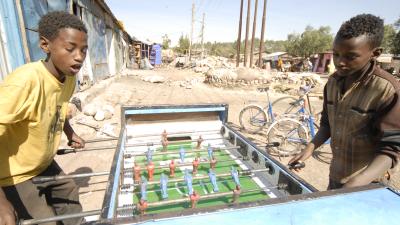
What affects boys’ trajectories through school and work, including their aspirations, agency, place, and changing roles and responsibilities within family and community contexts? What obstacles do adolescent boys face as they seek to transition into young adults?
These questions were addressed in a presentation by Gina Crivello and Nikki van der Gaag at the UK Development Studies Association conference on 7 Sept 2015.
In recent years, adolescence has risen high on the global agenda, but boys are marginalised by an overwhelming focus on female adolescence. While there has been much focus on the harms that social norms and expectations can cause for girls’ well-being, what it means to be a boy in any given time and place is also socially constructed and dynamic. This paper shows how boys too can be disadvantaged by sexual stereotypes, social norms and economic adversity, and how gender norms become more entrenched as adolescents develop into young adults. In particular, we see how boys’ aspirations decrease over time while girls’ aspirations increase, particularly after age 15. Girls in our sample are also more likely to stay on in school - at age 19, 66% of girls were still in education compared with 56% of boys, and the girls had, on average, completed slightly higher levels of schooling than the boys.
Securing paid work is key to boys’ transitions to adulthood, and at age 19, they strive for financial independence. They consider paid work to be a ‘protective factor’ in the sense that working prevents idleness and stagnation which they fear and resist. They also see themselves as ‘in-between’ childhood and adulthood – with a growing sense of responsibility and maturity, yet lacking adult authority and access to adult networks. Focusing much less on the promises of education for boys becoming men, work promises ‘change’ and represents persistence, hope and moral fortitude. But the reality of work is usually very different; a continual struggle to provide enough for themselves, their families, and their futures.
Download the presentation from Slideshare: Adolescent boys and gendered social transitions: Findings from Young Lives in Ethiopia, by Gina Crivello and Nikki van der Gaag
What affects boys’ trajectories through school and work, including their aspirations, agency, place, and changing roles and responsibilities within family and community contexts? What obstacles do adolescent boys face as they seek to transition into young adults?
These questions were addressed in a presentation by Gina Crivello and Nikki van der Gaag at the UK Development Studies Association conference on 7 Sept 2015.
In recent years, adolescence has risen high on the global agenda, but boys are marginalised by an overwhelming focus on female adolescence. While there has been much focus on the harms that social norms and expectations can cause for girls’ well-being, what it means to be a boy in any given time and place is also socially constructed and dynamic. This paper shows how boys too can be disadvantaged by sexual stereotypes, social norms and economic adversity, and how gender norms become more entrenched as adolescents develop into young adults. In particular, we see how boys’ aspirations decrease over time while girls’ aspirations increase, particularly after age 15. Girls in our sample are also more likely to stay on in school - at age 19, 66% of girls were still in education compared with 56% of boys, and the girls had, on average, completed slightly higher levels of schooling than the boys.
Securing paid work is key to boys’ transitions to adulthood, and at age 19, they strive for financial independence. They consider paid work to be a ‘protective factor’ in the sense that working prevents idleness and stagnation which they fear and resist. They also see themselves as ‘in-between’ childhood and adulthood – with a growing sense of responsibility and maturity, yet lacking adult authority and access to adult networks. Focusing much less on the promises of education for boys becoming men, work promises ‘change’ and represents persistence, hope and moral fortitude. But the reality of work is usually very different; a continual struggle to provide enough for themselves, their families, and their futures.
Download the presentation from Slideshare: Adolescent boys and gendered social transitions: Findings from Young Lives in Ethiopia, by Gina Crivello and Nikki van der Gaag


